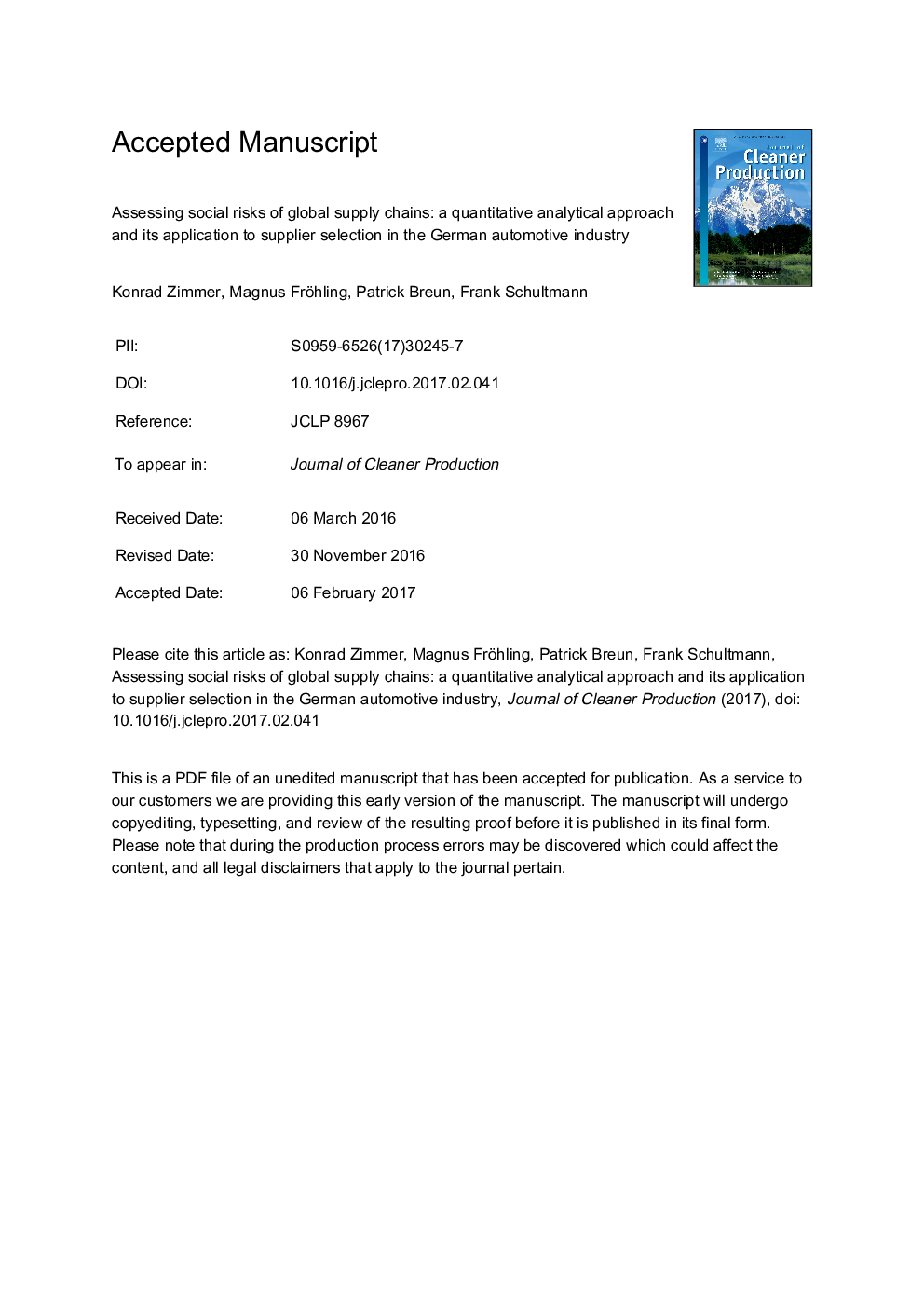| کد مقاله | کد نشریه | سال انتشار | مقاله انگلیسی | نسخه تمام متن |
|---|---|---|---|---|
| 5480717 | 1522104 | 2017 | 35 صفحه PDF | دانلود رایگان |
عنوان انگلیسی مقاله ISI
Assessing social risks of global supply chains: A quantitative analytical approach and its application to supplier selection in the German automotive industry
ترجمه فارسی عنوان
ارزیابی خطرات اجتماعی زنجیره های عرضه جهانی: رویکرد کمی تحلیلی و کاربرد آن در انتخاب تامین کنندگان در صنعت خودروسازی آلمان
دانلود مقاله + سفارش ترجمه
دانلود مقاله ISI انگلیسی
رایگان برای ایرانیان
کلمات کلیدی
موضوعات مرتبط
مهندسی و علوم پایه
مهندسی انرژی
انرژی های تجدید پذیر، توسعه پایدار و محیط زیست
چکیده انگلیسی
Risk management in Supply Chains has gained increasing attention over the last years. At the same time the pressure to consider social issues in global and interconnected supply chains has risen as well. These issues pose risk to supply chains since their occurrence may cause adverse stakeholder reaction through e.g. reputational losses. Despite the growing importance of supplier management as a key process within supply chains and the frequently articulated demand for a quantitative assessment of associated risks, such approaches are missing so far. Thus, the aim of this paper is to develop a model to efficiently estimate and assess social risks along global supply chains. For this purpose, Leontief's Input Output model is combined with country risks and sector specific labour intensities. In addition, a fuzzy analytical hierarchy process is used to weigh the various considered social risks. Thereby the focus is on the upstream supply chain of actors in a supply chain. The approach is developed generally, opening the possibility of adaption to different types of input-output data bases and using different social risks discussed in social life cycle assessment. The fuzzy analytical hierarchy process facilitates the operational application in companies, where different people with differing preferences are involved, e.g. in procurement decisions. The model is applied to a case study of a German premium car manufacturer to demonstrate and validate the approach. It is shown, how - based on the developed model - the assessment of supply chains risks can be carried out. The approach allows an assessment of the supply chain as a whole, i.e. considering all upstream tiers, and of specific tiers. Furthermore, a sensitivity analysis with regard to the obtained weights is conducted to verify the final aggregative risk values. The results show that there are huge differences in the social risks associated with different suppliers as well as different risk structures along the n-tier chain. This helps prioritizing any projects with the aim to improve the living and working conditions. In summary the model has a great benefit for practitioners in purchasing functions of focal companies and can be a helpful tool to support the efficient handling of social issues along supply chains. At the same time, its academic contributions lie in extending the life cycle sustainability analysis through a (multi-regional) socially extended input output model (SEIO) for social risk assessment in sustainable supply chain management.
ناشر
Database: Elsevier - ScienceDirect (ساینس دایرکت)
Journal: Journal of Cleaner Production - Volume 149, 15 April 2017, Pages 96-109
Journal: Journal of Cleaner Production - Volume 149, 15 April 2017, Pages 96-109
نویسندگان
Konrad Zimmer, Magnus Fröhling, Patrick Breun, Frank Schultmann,
